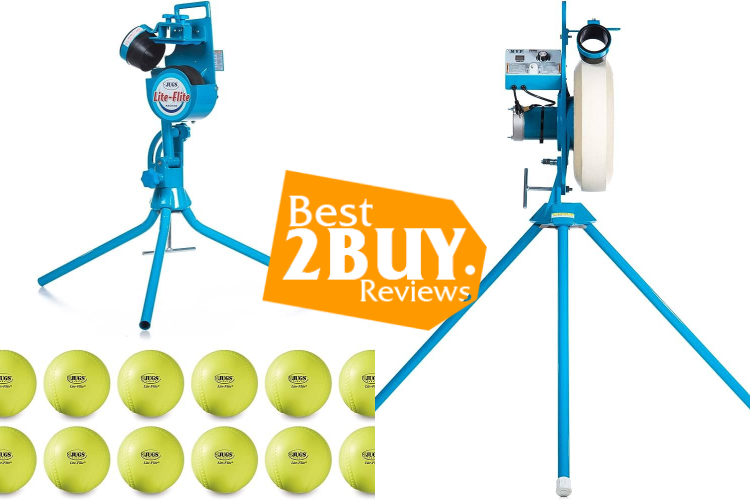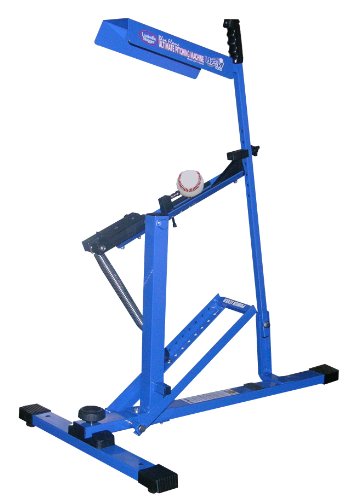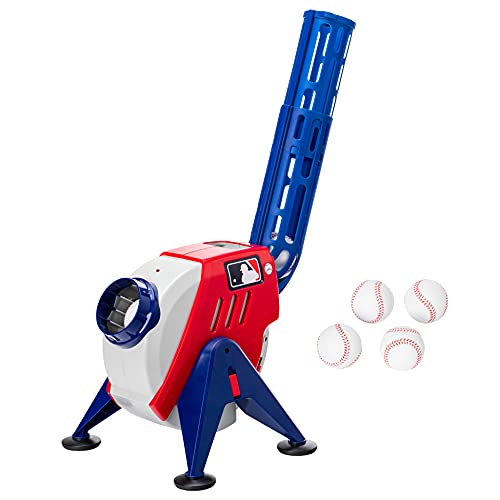How to Choose the Baseball & Softball Pitching Machines
With the right pitching machine, you can practice hitting balls with speed and accuracy to help you become a better hitter. This guide will walk you through the different types of pitching machines and provide tips on how to choose the right one for your batting practice needs.
- 1. What are Baseball & Softball Pitching Machines?
- 2. Types of Baseball & Softball Pitching Machines
- 2.1. Wheel Pitching Machines:
- 2.2. Pneumatic Pitching Machines:
- 2.3. Arm-Action Pitching Machines:
- 2.4. Hybrid Pitching Machines:
- 2.5. Manual Pitching Machines:
- 2.6. Electronic Pitching Machines:
- 2.7. Soft Toss Machines:
- 2.8. Portable Pitching Machines:
- 2.9. Fixed-Position vs. Movable Pitching Machines:
- 2.10. Pitching Machines for Specific Skills:
- 3. Benefits of Baseball & Softball Pitching Machines
- 3.1. Consistency
- 3.2. Repetition
- 3.3. Adjustability
- 3.4. Safety
- 3.5. Skill Development
- 3.6. Solo Practice
- 3.7. Gradual Progression
- 3.8. Pitch Variability
- 3.9. Focused Repetition
- 3.10. Time Efficiency
- 3.11. Mental Preparation
- 3.12. Team Training
- 4. How to choose Baseball & Softball Pitching Machines?
- 4.1. Identify Your Needs and Goals:
- 4.2. Pitching Machine Type:
- 4.3. Pitch Speed and Variability:
- 4.4. Portability and Setup:
- 4.5. Budget Considerations:
- 4.6. Ball Compatibility:
- 4.7. User Reviews and Recommendations:
- 4.8. Brand and Warranty:
- 4.9. Additional Features:
- 4.10. Try Before You Buy (If Possible):
- 4.11. Long-Term Growth:
- 4.12. Consult with Experts:
- 5. In conclusion
What are Baseball & Softball Pitching Machines?
Baseball and softball pitching machines are mechanical devices used to simulate and replicate the actions of a pitcher in the sports of baseball and softball. These machines are designed to throw consistent and accurate pitches at various speeds and styles, allowing players to practice their hitting skills without relying on a live pitcher.
Pitching machines are used in various settings, including batting cages, practice fields, and training facilities. They are popular tools for players of all skill levels, from beginners to professionals, as they provide a valuable means of improving hitting skills in a controlled environment. However, while pitching machines can be incredibly helpful for honing certain aspects of hitting, it's important for players to also face live pitching to develop a complete understanding of the game.

Types of Baseball & Softball Pitching Machines
There are several types of baseball and softball pitching machines available, each with its own features and advantages. Here are the main types:
Wheel Pitching Machines:
- Single-Wheel Machines: These machines use a single spinning wheel to propel the ball forward. They are generally more affordable and suitable for basic practice.
- Dual-Wheel Machines: These machines have two spinning wheels, which can provide greater accuracy and pitch variability. They can simulate different pitch types, speeds, and movements.
Pneumatic Pitching Machines:
- Air-Compressed Machines: These machines use compressed air to propel the ball. They offer consistent pitches and can be adjusted for different speeds and pitch types.
Arm-Action Pitching Machines:
- These machines replicate the throwing motion of a pitcher using a mechanical arm. They can deliver realistic pitches with varying speeds and movements.
Hybrid Pitching Machines:
- These machines combine features of different types, such as wheel and arm-action mechanisms. They aim to provide a balance between accuracy and versatility.
Manual Pitching Machines:
- These machines don't require electricity or batteries. They are powered by the user cranking a handle or lever to release the ball. They are often more affordable and portable but may not provide the same consistency as motorized options.
Electronic Pitching Machines:
- These machines have electronic controls for adjusting pitch speed, type, and location. Some advanced models can be programmed to deliver specific sequences of pitches.
Soft Toss Machines:
- These machines are designed for close-range hitting practice. They gently toss the ball upward for batters to hit. Soft toss machines are useful for developing hand-eye coordination and specific swing mechanics.
Portable Pitching Machines:
- These machines are designed for easy transport and setup. They are often used for personal practice at home or on the go.
Fixed-Position vs. Movable Pitching Machines:
- Fixed-Position Machines: These machines are stationary and typically used in batting cages or training facilities.
- Movable Machines: Some machines are designed to be portable and can be easily moved around the field for different practice scenarios.
Pitching Machines for Specific Skills:
- Some pitching machines are designed to focus on specific skills, such as pitch recognition or ball tracking. These machines might project images or lights onto a screen to simulate pitches.
Benefits of Baseball & Softball Pitching Machines
Baseball and softball pitching machines offer a range of benefits for players of all skill levels. Here are some of the key advantages:
Consistency
Pitching machines provide consistent pitch delivery in terms of speed, trajectory, and location. This consistency allows players to develop muscle memory, timing, and swing mechanics more effectively.
Repetition
Pitching machines allow players to get in a high volume of repetitions in a short amount of time. This repetitive practice is crucial for refining techniques and making adjustments to hitting mechanics.
Adjustability
These machines typically offer adjustable settings for pitch speed, pitch type (fastballs, curveballs, sliders, etc.), and location. Players can tailor their practice to focus on specific aspects of their hitting skills.
Safety
Pitching machines reduce the risk of injury that can come from facing live pitching at high speeds. This is particularly important for younger players who are still developing their skills.
Skill Development
Players can work on various aspects of their hitting technique, such as pitch recognition, plate discipline, and bat control, in a controlled environment.
Solo Practice
Pitching machines enable players to practice hitting on their own, without the need for a live pitcher. This is especially valuable for players who want to put in extra practice outside of team sessions.
Gradual Progression
Beginners can start with slower pitches and gradually increase the speed as they improve. This gradual progression helps build confidence and skills over time.
Pitch Variability
Some advanced pitching machines can simulate a wide range of pitches, including breaking balls and changeups. This helps players prepare for different pitch types they might face in real games.
Focused Repetition
Coaches can use pitching machines to work on specific areas of weakness for individual players. For example, a coach can consistently deliver inside pitches to a batter who struggles with inside pitches.
Time Efficiency
Pitching machines can save time during practice sessions by eliminating the need for a live pitcher to consistently deliver pitches.
Mental Preparation
Facing a pitching machine can help players develop mental focus and concentration, as they need to track the ball and make split-second decisions just like in a real game.
Team Training
Pitching machines can be used in team settings to facilitate drills that involve multiple players practicing hitting, fielding, and base running simultaneously.
While pitching machines offer numerous benefits, it's important to remember that they are a training tool and not a substitute for facing live pitching. Players should still practice against real pitchers to experience the nuances of timing, pitch movement, and game situations that can't be replicated by machines alone.
How to choose Baseball & Softball Pitching Machines?
Choosing the right baseball or softball pitching machine depends on various factors, including your skill level, intended use, budget, and specific needs. Here's a step-by-step guide to help you make an informed decision:
Identify Your Needs and Goals:
- Determine your skill level: Are you a beginner, intermediate, or advanced player?
- Consider your primary use: Will the machine be used for personal practice, team training, or both?
- Define your goals: What skills do you want to improve? Are you focusing on hitting, pitch recognition, or a combination of skills?
Pitching Machine Type:
- Choose between single-wheel and dual-wheel machines: Dual-wheel machines can provide greater pitch variety and accuracy but might be more expensive.
- Consider adjustable pitch types: Some machines allow you to practice various pitch types, such as fastballs, curveballs, and sliders.
Pitch Speed and Variability:
- Determine the range of pitch speeds you need: Different machines offer different speed ranges, so choose one that aligns with your skill level and goals.
- Consider pitch variability: Advanced machines can simulate different pitch movements, which can be beneficial for more experienced players.
Portability and Setup:
- Decide where you'll use the machine: If you plan to move it around frequently, consider a portable and lightweight option.
- Check the setup process: Choose a machine that is easy to set up and adjust, especially if you'll be using it on your own.
Budget Considerations:
- Set a budget range: Pitching machines come in a wide price range, so determine how much you're willing to spend.
- Balance features with cost: Consider the features that are essential for your training and balance them with your budget constraints.
Ball Compatibility:
- Confirm the ball type: Ensure that the machine is compatible with the baseball or softball size you'll be using (e.g., regulation size or dimpled training balls).
User Reviews and Recommendations:
- Research customer reviews: Look for feedback from users who have similar needs and goals as you.
- Ask for recommendations: Consult coaches, teammates, or fellow players for their input on the best options.
Brand and Warranty:
- Choose reputable brands: Opt for well-known brands that have a track record of producing reliable pitching machines.
- Check the warranty: A good warranty can provide you with peace of mind in case of any defects or issues.
Additional Features:
- Consider optional features: Some machines come with extras like remote controls, pitch speed indicators, and digital displays. Decide if these features are important to you.
Try Before You Buy (If Possible):
- If feasible, try out different machines at a sporting goods store or training facility to get a feel for their performance and adjustability.
Long-Term Growth:
- Consider your potential for growth: Choose a machine that can accommodate your skill improvement as you progress in your baseball or softball journey.
Consult with Experts:
- If you're unsure, consult with coaches, trainers, or experienced players who can provide insights based on their expertise.
By carefully considering these factors, you can select a baseball or softball pitching machine that aligns with your needs, goals, and budget, enhancing your training and skill development.
In conclusion
When choosing a Baseball & Softball Pitching Machines, consider your skill level, goals, budget, and intended use. The type of machine you choose should align with your training needs and help you improve your baseball or softball skills effectively.
If you want to buy a Baseball & Softball Pitching Machines, check out websites. We noted top products which highly appreciated. You can refer and buy it in store or shopping online. If you buy online, check out Amazon by click: “Buy it on Amazon”, it’s very convenient. Hope you will find and satisfied with your selection.
I’m David Lee - editor at best2buy.reviews. If you need our support. Kindly comment below. I’m always available to response you.










